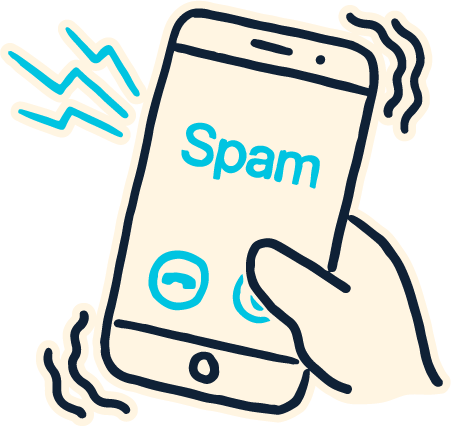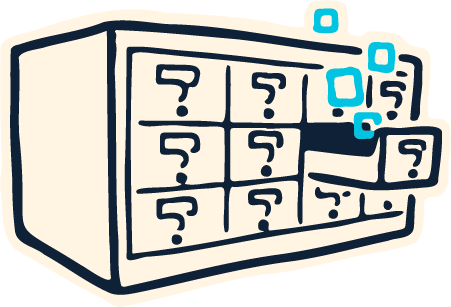Now that you are a pro at stopping spam on your phone and in your inbox, here are some thoughts on sharing what you've learned with library patrons

Transcript
Davis: Dan, thank you so much again for joining us for the series. It’s been really great to talk with you, as always.
Dan: It’s such a fun set of topics. Well, fun to talk about, not really all that fun to navigate.
Davis: I know, I do it all the time, and I feel the same way. I’m wondering if you wouldn’t mind reflecting back on the series a little bit. What would you say are the two or three biggest takeaways that you’d like to leave folks with today?
Dan: There are a few that come to mind. You don’t have to answer every call you get, and the call that looks like it’s coming from your area likely isn’t. Especially if it’s not from a number you know. We all carry mobile phones and are getting better at keeping them charged, so this chance of getting a call from a different number is very rare. Let it go to voicemail and listen in after the fact. Confirm with the purported caller via a number you know to be theirs before fulfilling the request that they made.
Data has both material and indirect value and that we should protect and defend it as such.
Same thing with email. They’re getting so good at looking legitimate that it’s hard to tell the real from the scams, but you can always ask the person that’s supposedly asking you for information by a known method of contact before clicking on the link or opening the attachment.
And, finally, data is being collected all the time and everywhere, but you can still take some actions to limit or shape the data that’s collected about you. There are plugins and extensions that limit data sharing in your browser. You can enable privacy-based DNS services to block access to sites that silently collect the data behind the scenes, and you can choose browsers that support privacy and not those that are actively helping collect it.
Davis: Great advice, thank you so much. Here’s a question on the opposite end of the spectrum. What if I wanted to do a deep dive on these issues? Where should I go to learn more on data privacy?
Dan: I really recommend the Electronic Frontier Foundation — eff.org — who are actively researching educating and advising on matters related to privacy as a civil liberty and are very visible on the scene. You can also look to the Federal Trade Commission at ftc.gov for more information on legislation and enforcement, which, by the way, is increasing since early 2021, as well as register your phone on the on the donotcall.gov Federal Do Not Call Registry.
Data is being collected all the time and everywhere, but you can still take some actions to limit or shape the data that’s collected about you.
Davis: Perfect, and just for those listening at home, we will drop those resources below this video, so you can check them out when you’re ready. Dan, final question: we are hoping to reach public library staff with these videos most especially. What advice might you give to someone in public service who is providing resources on privacy to the public?
Dan: Educate your communities. Privacy and data protection are fundamental parts of the library. Extend that ethos and mindset out to the patrons in your community, and share the idea that data has both material and indirect value and that we should protect and defend it as such. Keep doing what librarians do: research and educate.
Davis: I think I’m gonna have that printed on a bumper sticker. Dan, I’m so excited that you and I will be chatting, actually in just, like, five minutes or so, on series four. So I’ll see you then, and I’ll see everyone who’s watching later as well. Take care.
Further Reading
Stop Trackers Dead: The Best Private Browsers For 2022
The latest from PC Mag on selecting the best privacy-focused browser for youDNS Resolvers
A community-built list of DNS resolvers, for next-level privacy protectionElectronic Frontier Foundation
The Electronic Frontier Foundation is a nonprofit organization defending civil liberties in the digital world. EFF champions user privacy, free expression, and innovation through impact litigation, policy analysis, grassroots activism, and technology development.donotcall.gov
The National Do Not Call Registry from the Federal Trade CommissionFederal Trade Commission
The FTC's website. Search around for policy, advice, and other content about data privacy protections for consumers
Contributor Bios
- Daniel Ayala is a leader in the fields of information security, risk, and data privacy. He is Chief Security and Trust Officer at Dotmatics, hosts The Great Security Debate Podcast, and founded Mentor Core, an organization that seeks to bring together mentors and protégés from across the risk and compliance profession. Learn more about Dan's work at https://danielayala.com/.
- Davis Erin Anderson is Director of Programs and Partnerships at METRO Library Council.
- This project is funded by the Mayor’s Office of the Chief Technology Officer, and produced in collaboration with Brooklyn Public Library, The New York Public Library, and Queens Public Library.

